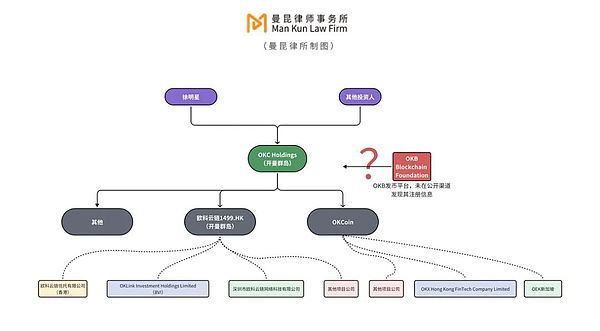
Source: Lawyer Jinjianzhi
The first problem that friends who start a blockchain project business encounters in law is registering a company.Registering a company will not constitute a legal difficulty for traditional projects, but for blockchain projects, due to regulatory issues in mainland China, most blockchain projects will go overseas.To register a company overseas, it is a relatively unfamiliar field for the founders. In addition to the business characteristics of blockchain projects, sometimes registering a company cannot solve the actual needs. So how many companies do you need to register?The answer to this question requires the project party to make flexibly choices based on its own scale, whether to issue tokens, strategy and business needs.
01Why set up multiple companies?
Generally speaking, some small blockchain projects may be early in the projectOnly one technology company is registered, mainly used to develop and maintain blockchain technology, and also to pay salaries for developers, rent offices, pay for some software subscriptions and accumulationintellectual propertyWait for operational tasks.This technology company is usually registered in the country or region where the founder is located, because this can facilitate management of the team, pay wages, and enjoy tax benefits.
For some larger blockchain projects, especially those involving multiple businesses, you can consider setting up different technology companies for different businesses; if the project involves commercial operations, marketing and profit models, you can consider registering an independent commercial company toHandle business affairs.
If the project conducts business globally, it may be necessary to register a company or branch in different countries to meet local regulations and operational needs.
Once the project decides to issue a token, the project party needs to set up a separate token issuing entity., There are four main reasons for this:
-
Convenient financing.It is convenient for investors to know which company will be designated in the investment documents;
-
Prepare a legal opinion for the listing of Token.Because most token listed platforms require a token legal opinion, and in most cases, if there is no registered legal entity, the legal opinion cannot be prepared;
-
Reduce regulatory risks.Some countries and regions have strict restrictions or bans on the issuance and transaction of tokens. Countries and regions that welcome blockchain technology may not necessarily welcome tokens, such as mainland China;
-
Carry out tax planning.Since token issuance may involve huge profits, choosing countries and regions with preferential tax rates to establish individual token issuance entities will reduce the tax burden.
existWhen choosing the establishment location of the token issuing entity, the two factors of taxation and supervision are mainly considered.In general, offshore areas such as the British Virgin Islands (BVI), Cayman Islands, or onshore areas such as Singapore and Hong Kong are the locations of token issuance entities that are more inclined to project parties or investors.BVI and Cayman Islands have no tax similar to corporate income, profits, and have a relatively loose regulatory attitude towards virtual currencies. From the perspective of taxation and regulatory, BVI and Cayman Islands are relatively convenient choices.
02How to build different companies?
When multiple companies are established, the problem of how to build a structure and facilitate management of multiple companies will naturally arise.Common and more mature frameworks are like the following framework of OK Group:

This structure is simplified by lawyer Mankunkin
According to public information on the Internet, OKLink (OKC Cloud Chain) and OKCoin’s parent company OKC Holdings are registered in the Cayman Islands.Xu Mingxing has become the largest shareholder and actual controller of OKC Holdings through several offshore companies registered in BVI.The subsidiaries of Okko Cloud Chain, namely the specific project companies include Okko Cloud Chain Trust Co., Ltd. (Hong Kong), OKLink Investment Holdings Limited (BVI), Shenzhen Okko Cloud Chain Network Technology Co., Ltd., etc., and OKCoin’s subsidiariesThere are OKX Singapore, OKX Hong Kong, OKX Brazil, etc., which are set up according to actual business needs.
At the same time, OK Group has set up another foundation specifically for the issuance of its tokens.However, attorney Mankunkin did not discover the partnership situation of his foundation through public channels, but speculated that his partners should include certain offshore companies and some natural person investors in the equity structure of OK Group.
Other project parties can fully refer to the OK Group’s architecture and combine their own needs to build their own multi-layer architecture.
03What is the legal form of DAO?
Although the above are all centralized corporate structures and some legal measures taken to achieve centralized management.But in some blockchain projects, founders will still adopt the form of DAO on issues such as community governance to achieve “decentralized autonomy”.
But if the DAO form only depends onSmart contractsWithout any legal appearance,DAO members will face legal risks that they are considered general partnerships, and DAO members will assume unlimited liability for their activities.For example, in the case of the US Commodity Futures Trading Commission (CFTC) v. Ooki DAO, since Ooki DAO did not form any legal entity, the judge believed that OOKI Token token holders influenced the results of the Ooki DAO governance proposal by governing token voting.OOKI Token token holders can be considered as voluntarily participating in Ooki DAO governance and need to bear personal responsibility for DAO’s actions.
Therefore, setting up a company for DAO will protect DAO members from potentially endless judicial, tax, financial and other responsibilities; at the same time, the establishment of a company will also regulate the financial management procedures of DAO, such as ensuring that gifts are issued from DAO TreasuryAML and KYC programs, etc.
04What does the lawyer Mankun Jinjianzhi suggest?
Establishing a blockchain project or multiple companies is a very compliant and practical issue. It requires consideration of multiple factors, especially in legal supervision and fiscal taxation.In the future of the bull market in the currency circle, if you are also ready to go overseas to develop and ride the wind and waves, it is recommended to consult professional compliance personnel to tailor it.








